|
The Locust, "Plague Soundscapes"
Anti
 After a couple years of hiatus, degrouping and regrouping, John Waters' favorite surrealistic futuristic thrash quartet return with their longest album to date. With 23 songs, their debut release for Epitaph's Anti Records is nearly double the length of their debut and almost everything else that's emerged from their chrysalis. Credit needs to be given to the San Diego crew for perhaps being one of the most efficient "rock" groups around, cramming full songs with verses and repeated choruses in an astounding amount of time (the longest song that graces this record is one second shy of being a minute and a half). The Locust have clearly passed into a new stage of development. The instrumental coordination is top notch, the onslaught is maddening, the coordination is astounding, and the technological integration is the most prominent as it has ever been. Doctors recommend that adults raise their heartbeat about 20 minutes every day. At slightly over 20 minutes, Plague Soundscapes can't hurt. Thematically, the Locust has migrated. The subject matter has gone from the borderline comically ridiculous to new, bizzare depths far knocking on the outposts of tangible reality. Songs like "Late for a Double Date with a Pile of Atoms in the Water Closet," where full-throttle belched out lyrics like "Arbiter of shittily planned dilemmas, you were born with only three faces," are just an example of the true verbal surrealism the band practices and has been perfecting over the years together. Printed lyrics are marginally helpful but don't ever count on being able to sing along. The practice and dedication involved has taken years to perfect and the strain on their voices must be taking years off their lives. For those fortunate enough to have their town plagued by The Locust, be warned that their live sets rarely stretch longer than 12 minutes, so don't be a fool and use up your bathroom and bar time in time before their set commences. Inside those 12 minutes is a deafening glare of pure energy, but blink and it's over. As a bonus, the video for "The Half-Eaten Sausage Would Like To See You In His Office" is included - Jon Whitney
After a couple years of hiatus, degrouping and regrouping, John Waters' favorite surrealistic futuristic thrash quartet return with their longest album to date. With 23 songs, their debut release for Epitaph's Anti Records is nearly double the length of their debut and almost everything else that's emerged from their chrysalis. Credit needs to be given to the San Diego crew for perhaps being one of the most efficient "rock" groups around, cramming full songs with verses and repeated choruses in an astounding amount of time (the longest song that graces this record is one second shy of being a minute and a half). The Locust have clearly passed into a new stage of development. The instrumental coordination is top notch, the onslaught is maddening, the coordination is astounding, and the technological integration is the most prominent as it has ever been. Doctors recommend that adults raise their heartbeat about 20 minutes every day. At slightly over 20 minutes, Plague Soundscapes can't hurt. Thematically, the Locust has migrated. The subject matter has gone from the borderline comically ridiculous to new, bizzare depths far knocking on the outposts of tangible reality. Songs like "Late for a Double Date with a Pile of Atoms in the Water Closet," where full-throttle belched out lyrics like "Arbiter of shittily planned dilemmas, you were born with only three faces," are just an example of the true verbal surrealism the band practices and has been perfecting over the years together. Printed lyrics are marginally helpful but don't ever count on being able to sing along. The practice and dedication involved has taken years to perfect and the strain on their voices must be taking years off their lives. For those fortunate enough to have their town plagued by The Locust, be warned that their live sets rarely stretch longer than 12 minutes, so don't be a fool and use up your bathroom and bar time in time before their set commences. Inside those 12 minutes is a deafening glare of pure energy, but blink and it's over. As a bonus, the video for "The Half-Eaten Sausage Would Like To See You In His Office" is included - Jon Whitney
samples:
Manual/Icebreaker International, "Into Forever"
Morr/Sound of a Handshake
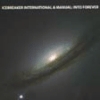 Resident Morr space cadets Manual (Jonas Munk) and Icebreaker International (Alexander Perls) have teamed up to produce this first release for Morr Music's sub-label Sound of a Handshake. This collaboration was hinted at last year on the Morr compilation/Slowdive tribute Blue Skied an' Clear, to which Manual and Icebreaker contributed this record's title piece. They expand the project to eight songs here which if you lied to me and told me the songs were purely Manual solo works, I would readily believe you. Manual trades in atmospheric guitar works to which he adds subtle electronics and melodic undertones, while Icebreaker creates concept albums which sound a slightly more abstract branch of the Piano Magic school. The opener, "The Countdown," features Manual's signature warbly guitar lines understated by a metronomic beat in the background. This song in particular peppers and prepares you for the whirling and swirling noises to be expected for the rest of the album. The title track, "Into Forever," has this wanky guitar part which harks back to some lost remix of a Sting song from his adult contemporary days (perhaps circa "Ten Summoner's Tales" or "Soul Cages") and is really the only objectionable song on the album. Curiously, it was the song included on the Slowdive tribute, yet I have trouble seeing how Slowdive contributed to or inspired the song. Icebreaker makes its sound known slightly in "The Inner Rings," which begins with an echoing din of an empty ship hull but rises to a more ecclesiastical or angelic drone by the end. The highlight of the album has to be "A Turning" (is it a coincidence that all the song titles sound like Brian Eno titles?). The song is a persuasive combination of three chord picked progression, Manual's warbly guitar effects, and a haunting and ghostly vocal wail which fills out the song's substance. "The Outer Rings" once again showcases Icebreaker's sound and makes you begin to think that Perls is responsible soley for the ring cycle on this album, whereas most of the other contributions are strictly Munk's. This is certainly true for "Beacon," which sounds as if it was lifted directly from Manual's "Ascend" album. I could try and tell you about the outer space infinite music loop concept prepared (conceivably by Icebreaker) for this album, but it's pure fantasy and adds nothing to the music itself. Better to enjoy these songs for their terrestrial charms. - Joshua David Mann
Resident Morr space cadets Manual (Jonas Munk) and Icebreaker International (Alexander Perls) have teamed up to produce this first release for Morr Music's sub-label Sound of a Handshake. This collaboration was hinted at last year on the Morr compilation/Slowdive tribute Blue Skied an' Clear, to which Manual and Icebreaker contributed this record's title piece. They expand the project to eight songs here which if you lied to me and told me the songs were purely Manual solo works, I would readily believe you. Manual trades in atmospheric guitar works to which he adds subtle electronics and melodic undertones, while Icebreaker creates concept albums which sound a slightly more abstract branch of the Piano Magic school. The opener, "The Countdown," features Manual's signature warbly guitar lines understated by a metronomic beat in the background. This song in particular peppers and prepares you for the whirling and swirling noises to be expected for the rest of the album. The title track, "Into Forever," has this wanky guitar part which harks back to some lost remix of a Sting song from his adult contemporary days (perhaps circa "Ten Summoner's Tales" or "Soul Cages") and is really the only objectionable song on the album. Curiously, it was the song included on the Slowdive tribute, yet I have trouble seeing how Slowdive contributed to or inspired the song. Icebreaker makes its sound known slightly in "The Inner Rings," which begins with an echoing din of an empty ship hull but rises to a more ecclesiastical or angelic drone by the end. The highlight of the album has to be "A Turning" (is it a coincidence that all the song titles sound like Brian Eno titles?). The song is a persuasive combination of three chord picked progression, Manual's warbly guitar effects, and a haunting and ghostly vocal wail which fills out the song's substance. "The Outer Rings" once again showcases Icebreaker's sound and makes you begin to think that Perls is responsible soley for the ring cycle on this album, whereas most of the other contributions are strictly Munk's. This is certainly true for "Beacon," which sounds as if it was lifted directly from Manual's "Ascend" album. I could try and tell you about the outer space infinite music loop concept prepared (conceivably by Icebreaker) for this album, but it's pure fantasy and adds nothing to the music itself. Better to enjoy these songs for their terrestrial charms. - Joshua David Mann
samples:
substanz-t, "electric opium"
Hymen
 Post-industrial music is about as loosely defined as a genre can get, and with artists ranging from the beat-driven cacophony of Somatic Responses and Venetian Snares to the electro experiments of Lusine ICL and Starfish Pool, Hymen Records has managed to stay within its boundaries. At one time, the same could be said for Substanz-T, whose track "Industrial Music for Industrial People" reminded us that "if you don't like fascism, don't play industrial music." As the jazzy, urban vibes of their Hymen debut Tripped Experiences and their latest longplayer Electric Opium suggest, the Frankfurt duo have either developed a dislike for said philosophy, or simply grew up. While their so-called peers are content to remain stagnant in black make-up and fishnets, Substanz-T have opted out in order to create their downtempo gems. On their latest disc, they have collaborated on multiple tracks with former Einsturzende Neubauten member F.M. Einheit, another musician who has moved past the clang and bang of gloomy industrial music. Electric Opium shifts their sound further away from the Kruder and Dorfmeister school of cool, resulting in a musical work both percussive and pensive. The overall mood is decidedly ambient, whether on the Basic Channel influenced "Steer The Stars," or the intelligent hip hop of "Place Cells." The Ninja Tune-worthy, echo-heavy soundtrack of "Rekall" is only further accented by the clever use of theramin, and the track best represents the collaborative spirit of the album. "Ubique" holds true to the essence of chillout originators such as The Orb over its 18 minutes of soft cinematic synth washes, crackling percussion, and ultra-minimal specks of audio dirt. To call Electric Opium ideal for Sunday listening would not do it justice. To call it an album that grows on you would be and out-and-out insult. In all honesty, this is truly a painstakingly constructed collection of songs with more than its fair share of nuances and studio-crafted subtlety. Goodbye post-industrial. Hello new ambient. - Gary Suarez
Post-industrial music is about as loosely defined as a genre can get, and with artists ranging from the beat-driven cacophony of Somatic Responses and Venetian Snares to the electro experiments of Lusine ICL and Starfish Pool, Hymen Records has managed to stay within its boundaries. At one time, the same could be said for Substanz-T, whose track "Industrial Music for Industrial People" reminded us that "if you don't like fascism, don't play industrial music." As the jazzy, urban vibes of their Hymen debut Tripped Experiences and their latest longplayer Electric Opium suggest, the Frankfurt duo have either developed a dislike for said philosophy, or simply grew up. While their so-called peers are content to remain stagnant in black make-up and fishnets, Substanz-T have opted out in order to create their downtempo gems. On their latest disc, they have collaborated on multiple tracks with former Einsturzende Neubauten member F.M. Einheit, another musician who has moved past the clang and bang of gloomy industrial music. Electric Opium shifts their sound further away from the Kruder and Dorfmeister school of cool, resulting in a musical work both percussive and pensive. The overall mood is decidedly ambient, whether on the Basic Channel influenced "Steer The Stars," or the intelligent hip hop of "Place Cells." The Ninja Tune-worthy, echo-heavy soundtrack of "Rekall" is only further accented by the clever use of theramin, and the track best represents the collaborative spirit of the album. "Ubique" holds true to the essence of chillout originators such as The Orb over its 18 minutes of soft cinematic synth washes, crackling percussion, and ultra-minimal specks of audio dirt. To call Electric Opium ideal for Sunday listening would not do it justice. To call it an album that grows on you would be and out-and-out insult. In all honesty, this is truly a painstakingly constructed collection of songs with more than its fair share of nuances and studio-crafted subtlety. Goodbye post-industrial. Hello new ambient. - Gary Suarez
samples:
Arbete & Fritid, "Arbete & Fritid"
Music Network
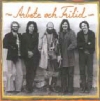 For a thirty-year-old record to still sound ahead of its time is quite a feat. Arbete & Fritid are one of few bands lucky enough to be called legends. That they were Swedish is incidental, and to try and categorize the music they made is a futile pursuit. Their live performances were not to be missed, as they could easily shift from one musical language to another, crossing styles and genres jazz and rock but always with a folk base. Listening to this, their third album, today is like opening a time capsule and hearing a Nordic folk band that could have recorded this music fifteen minutes ago. The reissue also includes a rare bonus track, recorded for Swedish National Radio, that shows the band in their best light. The CD on a whole is like one big wedding party: there's the bachelor party on "Gånglåt efter Lejsme Per Larsson, Malung," a ribald gyration but all in all suave and soaring presence of an album opener; the tryst of "Elâzig-dans," where the lovers dance for the world to see, and profess their undying devotions to each other; and then the album moves its way through the wedding march and on to the reception. There are a few exceptions to this general mood, such as the dark brooding feel of "The European Way," and the pure feral angst of "Petrokemi Det Kan Man Inte Bada I"—my favorite due to the saxophones and throated chants. I hear the strains of countless bands of today in this sound. For the most part, though, this is a classic, gorgeous record that presents a range of emotions anyone can identify with, despite an inability to understand the words, the titles, or read the liner notes. - Rob Devlin
For a thirty-year-old record to still sound ahead of its time is quite a feat. Arbete & Fritid are one of few bands lucky enough to be called legends. That they were Swedish is incidental, and to try and categorize the music they made is a futile pursuit. Their live performances were not to be missed, as they could easily shift from one musical language to another, crossing styles and genres jazz and rock but always with a folk base. Listening to this, their third album, today is like opening a time capsule and hearing a Nordic folk band that could have recorded this music fifteen minutes ago. The reissue also includes a rare bonus track, recorded for Swedish National Radio, that shows the band in their best light. The CD on a whole is like one big wedding party: there's the bachelor party on "Gånglåt efter Lejsme Per Larsson, Malung," a ribald gyration but all in all suave and soaring presence of an album opener; the tryst of "Elâzig-dans," where the lovers dance for the world to see, and profess their undying devotions to each other; and then the album moves its way through the wedding march and on to the reception. There are a few exceptions to this general mood, such as the dark brooding feel of "The European Way," and the pure feral angst of "Petrokemi Det Kan Man Inte Bada I"—my favorite due to the saxophones and throated chants. I hear the strains of countless bands of today in this sound. For the most part, though, this is a classic, gorgeous record that presents a range of emotions anyone can identify with, despite an inability to understand the words, the titles, or read the liner notes. - Rob Devlin
samples:
Jesse Malin, "The Fine Art of Self-Destruction"
 Former D Generation frontman Jesse Malin is an odd mix of Bob Dylan, Mark Knopfler, and Neil Young in the vocal department, and on his debut solo album, he shows he's straying further and further from his punk rock roots to become a roots rock punk. With frequent cohort Ryan Adams at the knobs and sliders and on electric guitar, Malin is free to let out his more troubadour tendencies, spinning yarns of lost love and dying dreams. For the most part, the formula works just as long as you can get past Malin's aforementioned voice and some occasional trite imagery, mostly involving the repeated mention of cigarettes. On the cover, Malin projects the image and feel this album most embodies: a subway performer, strumming away on his acoustic guitar, begging people to throw him a couple quarters. He's that unlucky sap with an open guitar case and a Yamaha acoustic, track after track, waiting for his luck to change rather than try and change it himself. Even though it rocks out here and there, like on "Wendy," and "High Lonesome," there is an overwhelming emptiness and depression throughout the record. Malin is here, warts and all, including the most awful vocal moments imaginable in places ("Solitaire" with its strained wails), and decidedly low production values. He paints a picture of New York City from the dim side, where people are down on their luck, can't even afford a beer, and just want someone to notice. It's not a new theme, not a new approach, and Malin's not a new voice; but it's still a pretty good debut, with some varied flavors, and he occasionally hints at a grandeur that might rival New Jersey's favorite son someday. - Rob Devlin
Former D Generation frontman Jesse Malin is an odd mix of Bob Dylan, Mark Knopfler, and Neil Young in the vocal department, and on his debut solo album, he shows he's straying further and further from his punk rock roots to become a roots rock punk. With frequent cohort Ryan Adams at the knobs and sliders and on electric guitar, Malin is free to let out his more troubadour tendencies, spinning yarns of lost love and dying dreams. For the most part, the formula works just as long as you can get past Malin's aforementioned voice and some occasional trite imagery, mostly involving the repeated mention of cigarettes. On the cover, Malin projects the image and feel this album most embodies: a subway performer, strumming away on his acoustic guitar, begging people to throw him a couple quarters. He's that unlucky sap with an open guitar case and a Yamaha acoustic, track after track, waiting for his luck to change rather than try and change it himself. Even though it rocks out here and there, like on "Wendy," and "High Lonesome," there is an overwhelming emptiness and depression throughout the record. Malin is here, warts and all, including the most awful vocal moments imaginable in places ("Solitaire" with its strained wails), and decidedly low production values. He paints a picture of New York City from the dim side, where people are down on their luck, can't even afford a beer, and just want someone to notice. It's not a new theme, not a new approach, and Malin's not a new voice; but it's still a pretty good debut, with some varied flavors, and he occasionally hints at a grandeur that might rival New Jersey's favorite son someday. - Rob Devlin
samples:
Listener, "Whispermoon"
Mush
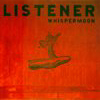 Every single song on Whispermoon is moody, dark, soulful, and reminds me of an old, sparsely populated bar in the middle of a desert somewhere around dusk. Live drums, upright bass, bluesy vocal samples, and a smattering of scratching and coarse atmospheres bounce about the entire album weaving catchy melodies and smooth grooves. "Train Song" features a ringing acoustic guitar, a beautiful female vocal part that summons the blues, and an irresistible beat fed by both live drums and thick digital bass drops. "Decadence," on the other hand, is a beat-heavy and more vocally dexterous track, fed by the energy of a bass guitar and Manchild's raps. Thematically, the topics of many of the songs are a bit grandiose and this is where Listener's weakness is exposed. "You're So Underground" attempts to critique the I'm-a-player attitude so popular in rap but ends up falling short in the rhyme-department. Listener's writing isn't entirely bad, but it's certainly not as strong as it could be. I find myself agreeing with a lot of what the guy has to say, but I often feel as if it could be said with more command. That's not to say that every rap Listener makes is dull. The aforementioned "Train Song" is a gorgeous narrative the likes of which I've never heard in hip-hop. It's just that some of themes (such as drug use, love, media, and religion) are laid so bare as to be a bit cheesey; many of the lyrics simply come off as too calculated and his vocal style begins to sound repetitive as the album moves along. Musically this album is colorful, inescapably catchy, and varied; there's not a dull moment to be found. Perhaps with some reflection and a bit more discipline Listener will become a lyrical force to be reckoned with, as well. - Lucas Schleicher
Every single song on Whispermoon is moody, dark, soulful, and reminds me of an old, sparsely populated bar in the middle of a desert somewhere around dusk. Live drums, upright bass, bluesy vocal samples, and a smattering of scratching and coarse atmospheres bounce about the entire album weaving catchy melodies and smooth grooves. "Train Song" features a ringing acoustic guitar, a beautiful female vocal part that summons the blues, and an irresistible beat fed by both live drums and thick digital bass drops. "Decadence," on the other hand, is a beat-heavy and more vocally dexterous track, fed by the energy of a bass guitar and Manchild's raps. Thematically, the topics of many of the songs are a bit grandiose and this is where Listener's weakness is exposed. "You're So Underground" attempts to critique the I'm-a-player attitude so popular in rap but ends up falling short in the rhyme-department. Listener's writing isn't entirely bad, but it's certainly not as strong as it could be. I find myself agreeing with a lot of what the guy has to say, but I often feel as if it could be said with more command. That's not to say that every rap Listener makes is dull. The aforementioned "Train Song" is a gorgeous narrative the likes of which I've never heard in hip-hop. It's just that some of themes (such as drug use, love, media, and religion) are laid so bare as to be a bit cheesey; many of the lyrics simply come off as too calculated and his vocal style begins to sound repetitive as the album moves along. Musically this album is colorful, inescapably catchy, and varied; there's not a dull moment to be found. Perhaps with some reflection and a bit more discipline Listener will become a lyrical force to be reckoned with, as well. - Lucas Schleicher
samples:
MARTIN HORNTVETH, "SKULL"
Smalltown Supersound
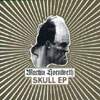 Best known for his work as bandleader and drummer for Norwegian collective Jaga Jazzist, Martin Horntveth sets aside the sticks to concentrate more on the role of sound manipulator, mixer and producer on his second solo release. While the prevalent, fast-paced industrial sounds on the six-track Skull EP have very little in common with the style of music that Jaga Jazzist perform, certain elements of rhythms and low end sounds may seem familiar. Grinding gears at the top of the disc, "100%" fuses distorted up-tempo beats and demolished keyboard bass sounds with high-pitched dental drill chirps and whistling, detuned keyboard lines for a track that teeters on the edge of cacophony. The warm, floating tremolo keyboard and heavy, precise drum machine propelled "Comic" is littered with clipped spoken word samples and sound snippets, which can be followed along with on the handy, phonetically sounded "lyric" sheet inside the disc's front cover. Horntveth adds his frenetic sampling of beats and synth squelches to fellow Norwegian metal outfit NOPLACETOHIDE's tight, chugging guitars for a sixty second rendition of a track of theirs on "Sole (Remix)." The distorted shuffle of "Szakal Is Home For X-Mas" rounds out Skull's twenty minutes with an arrangement of squelches and bass end that bring in a pretty keyboard melody which, by the tune's end, glimmers through to slightly convey the festive mood indicated in the title. The farthest thing from a "drummer" record, Horntveth's electronic-based compositions and arrangements are solid enough to provide a viable outlet aside from Jaga Jazzist and make a name known by those that don't necessarily read liner notes. - Gord Fynes
Best known for his work as bandleader and drummer for Norwegian collective Jaga Jazzist, Martin Horntveth sets aside the sticks to concentrate more on the role of sound manipulator, mixer and producer on his second solo release. While the prevalent, fast-paced industrial sounds on the six-track Skull EP have very little in common with the style of music that Jaga Jazzist perform, certain elements of rhythms and low end sounds may seem familiar. Grinding gears at the top of the disc, "100%" fuses distorted up-tempo beats and demolished keyboard bass sounds with high-pitched dental drill chirps and whistling, detuned keyboard lines for a track that teeters on the edge of cacophony. The warm, floating tremolo keyboard and heavy, precise drum machine propelled "Comic" is littered with clipped spoken word samples and sound snippets, which can be followed along with on the handy, phonetically sounded "lyric" sheet inside the disc's front cover. Horntveth adds his frenetic sampling of beats and synth squelches to fellow Norwegian metal outfit NOPLACETOHIDE's tight, chugging guitars for a sixty second rendition of a track of theirs on "Sole (Remix)." The distorted shuffle of "Szakal Is Home For X-Mas" rounds out Skull's twenty minutes with an arrangement of squelches and bass end that bring in a pretty keyboard melody which, by the tune's end, glimmers through to slightly convey the festive mood indicated in the title. The farthest thing from a "drummer" record, Horntveth's electronic-based compositions and arrangements are solid enough to provide a viable outlet aside from Jaga Jazzist and make a name known by those that don't necessarily read liner notes. - Gord Fynes
samples:
World Standard & Wechsel Garland, "The Isle"
P-Vine
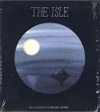 Vastness of an ocean or shallowness of a bathtub? The Isle was quietly put on a musical map by Japanese cartographers P-Vine back in April, joining the ranks of sea-themed concept albums such as Piano Magic's A Trick of the Sea and Rachel's The Sea and the Bells (diaries of aquatic adventures, scrupulous accounts of seasickness, logbooks of navel/naval gazing). Unlike its conceptual predecessors, the creators of The Isle do not go after the epic and the expansive but aim for the childish and the minimal: a fairy tale. It's a split album cleverly disguised as a collaboration. Tokyo's Sohichiro Suzuki (World Standard) and Cologne's Jörg Follert (Wechsel Garland, Wunder, 1/3 of Visor) each contributed seven compositions and 'co-wrote' only the title track, swapping ideas via mail. On first encounter, Suzuki's and Follert's previous efforts seem more satisfying than this. Through their infantile melodies and simplistic arrangements, the musicians channel not the vastness and deepness of the sea but the rather comfortable confines of a washbasin. A faint asthmatic wheeze of a rubber ducky at the end of the first track reinforces this impression. Subsequent listens, however, reveal a much richer palette of mood, harmony and texture, full of subtleties that were not apparent initially. Acoustic guitars, xylophones, toy pianos, melodicas and violins (most of the string parts masterfully played by an uncredited Susanna Welsch) are weaving a patchwork of pointillist waltzes, plinky bossa-novas, mournful ambient vignettes, and even one harpsichord-driven ballad beautifully sung (in German) by Follert, "The Harbour," which, incidentally, is the only vocal piece on the album. The result is not a heavy-lidded Odyssey but rather a Treasure Island as enacted by talented carefree kids, wearing oversized Hessian boots and paper cocked hats, with prop parrots perched on their narrow shoulders and plastic spyglasses pressed firmly to their wide-open eyes. This is Visine-washed music, clear and bright. The latitude and longitude of The Isle may be different from the ambient banjoisms of World Standard's Country Gazette or cinematic dubisms of Wechsel Garland's Liberation von History but it confidently stands on its own in the murky sea of this year's music. The last harbor for the Lost Children. - Dmitry Elentuck
Vastness of an ocean or shallowness of a bathtub? The Isle was quietly put on a musical map by Japanese cartographers P-Vine back in April, joining the ranks of sea-themed concept albums such as Piano Magic's A Trick of the Sea and Rachel's The Sea and the Bells (diaries of aquatic adventures, scrupulous accounts of seasickness, logbooks of navel/naval gazing). Unlike its conceptual predecessors, the creators of The Isle do not go after the epic and the expansive but aim for the childish and the minimal: a fairy tale. It's a split album cleverly disguised as a collaboration. Tokyo's Sohichiro Suzuki (World Standard) and Cologne's Jörg Follert (Wechsel Garland, Wunder, 1/3 of Visor) each contributed seven compositions and 'co-wrote' only the title track, swapping ideas via mail. On first encounter, Suzuki's and Follert's previous efforts seem more satisfying than this. Through their infantile melodies and simplistic arrangements, the musicians channel not the vastness and deepness of the sea but the rather comfortable confines of a washbasin. A faint asthmatic wheeze of a rubber ducky at the end of the first track reinforces this impression. Subsequent listens, however, reveal a much richer palette of mood, harmony and texture, full of subtleties that were not apparent initially. Acoustic guitars, xylophones, toy pianos, melodicas and violins (most of the string parts masterfully played by an uncredited Susanna Welsch) are weaving a patchwork of pointillist waltzes, plinky bossa-novas, mournful ambient vignettes, and even one harpsichord-driven ballad beautifully sung (in German) by Follert, "The Harbour," which, incidentally, is the only vocal piece on the album. The result is not a heavy-lidded Odyssey but rather a Treasure Island as enacted by talented carefree kids, wearing oversized Hessian boots and paper cocked hats, with prop parrots perched on their narrow shoulders and plastic spyglasses pressed firmly to their wide-open eyes. This is Visine-washed music, clear and bright. The latitude and longitude of The Isle may be different from the ambient banjoisms of World Standard's Country Gazette or cinematic dubisms of Wechsel Garland's Liberation von History but it confidently stands on its own in the murky sea of this year's music. The last harbor for the Lost Children. - Dmitry Elentuck
samples:
MORGAN CANEY AND KAMAL JOORY, "MAGIC RADIOS"
City Centre Offices
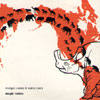 Originally released in September 2002, Magic Radios is the documented collaboration between experimental jazz musician Morgan Caney and electronic-based composer Kamal Joory, showcasing an interesting blend of both their backgrounds for nine compositions and a remix. The squeaks and subtle pops implying the rhythm on the opener "Blanket" become slightly more musical in context with the addition of distant keyboard drones and a repeating warm, cheerful bassline that doesn't grow tiresome. The layering of reverbed machine samba rhythms and sounds on "3,000 Miles" are the anchor for a smokey horn section motif to cycle through while lower register flute melodies pop in and out. The processed, Brazilian-flavored guitar, bass end and soaring violin on "Crispy Leaves Underfoot" moves into a very full composition with the layering of keyboards paired with long-lined melodies, all held together with a steady, hiphop-tinged beat. The surprise track for me towards the end of the disc is "Darling." As close to traditional as anything else on the disc gets, the track's sunny acoustic guitar and vibes progressions and upright-sounding bass are topped by very distant, reverbed and harmonized vocals that convey a very 1950's style of country singing on the radio waves of the day. I can't help but visualize some sort of scene from a David Lynch flick upon hearing it in this context. The presence of weaving violin (or perhaps fiddle in this case) add to the track's somewhat authentic sound. Caney and Joory have put together an interesting and creative writing style throughout Magic Radios, based on somewhat diverse influences and backgrounds. From what I'm hearing, my only complaint is that there are times when it sounds as though their compositions and outputs are playing it too safe where some areas could be stretched further. I'm sure that restraint, at times, is part and parcel of working in the collaborative environment as not to tread on each others toes. - Gord Fynes
Originally released in September 2002, Magic Radios is the documented collaboration between experimental jazz musician Morgan Caney and electronic-based composer Kamal Joory, showcasing an interesting blend of both their backgrounds for nine compositions and a remix. The squeaks and subtle pops implying the rhythm on the opener "Blanket" become slightly more musical in context with the addition of distant keyboard drones and a repeating warm, cheerful bassline that doesn't grow tiresome. The layering of reverbed machine samba rhythms and sounds on "3,000 Miles" are the anchor for a smokey horn section motif to cycle through while lower register flute melodies pop in and out. The processed, Brazilian-flavored guitar, bass end and soaring violin on "Crispy Leaves Underfoot" moves into a very full composition with the layering of keyboards paired with long-lined melodies, all held together with a steady, hiphop-tinged beat. The surprise track for me towards the end of the disc is "Darling." As close to traditional as anything else on the disc gets, the track's sunny acoustic guitar and vibes progressions and upright-sounding bass are topped by very distant, reverbed and harmonized vocals that convey a very 1950's style of country singing on the radio waves of the day. I can't help but visualize some sort of scene from a David Lynch flick upon hearing it in this context. The presence of weaving violin (or perhaps fiddle in this case) add to the track's somewhat authentic sound. Caney and Joory have put together an interesting and creative writing style throughout Magic Radios, based on somewhat diverse influences and backgrounds. From what I'm hearing, my only complaint is that there are times when it sounds as though their compositions and outputs are playing it too safe where some areas could be stretched further. I'm sure that restraint, at times, is part and parcel of working in the collaborative environment as not to tread on each others toes. - Gord Fynes
samples:
Akrobatik, "Balance"
Coup d'Etat
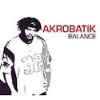 Just after Saul Williams' Amethyst Rock Star was released, I got into some great arguments with longtime hip-hop fans who found his high-minded, pandering-be-damned (literally) approach to hip-hop a tad bit pretentious. Similar complaints can't be made about Akrobatik, who comes across instead like the cool-but-savvy uncle that every kid should be able to turn to for advice. Ak is all for doling out the science, but like he says on the title track, "You can study for years and be the world's top scholar, but trying to make the fans feel dumb won't make 'em holler." Most of the album is about keeping it together in one way or another, finding common ground between the nerds and the thugs, building communities that sustain themselves, and generally being excellent to one another: Keanu Reeves would be proud, and the front-porch family feel of most of the album makes for friendly, comfortable listening. The inclusion of "Woman, Pt. II" (an honest take on the conflicting impulses behind dating) just lends, well, balance to the proceedings. As you might expect by now, Balance feels more like the effort of an accomplished craftsman than the product of some firebrand artist: the bombast and atmosphere of, say, a Def Jux or Hieroglyphics record is nowhere in sight, and I'm not always in the mood for the Sunday-afternoon coziness of some of this stuff. (Think Blackalicious without the craziest of the verbal gymnastics and you've just about got it.) Oh, and it does feature one bog-standard Obnoxious DJ Intro (courtesy of Evil Dee, on the album-low track "Always Bet On Ak")... I guess that's a negative point, too. As antidotes to hip-pop go, though, this one is well worth hearing. That might not be the strongest recommendation possible, but maybe unassuming support is what's called for with an album and an artist like this. - Taylor McLaren
Just after Saul Williams' Amethyst Rock Star was released, I got into some great arguments with longtime hip-hop fans who found his high-minded, pandering-be-damned (literally) approach to hip-hop a tad bit pretentious. Similar complaints can't be made about Akrobatik, who comes across instead like the cool-but-savvy uncle that every kid should be able to turn to for advice. Ak is all for doling out the science, but like he says on the title track, "You can study for years and be the world's top scholar, but trying to make the fans feel dumb won't make 'em holler." Most of the album is about keeping it together in one way or another, finding common ground between the nerds and the thugs, building communities that sustain themselves, and generally being excellent to one another: Keanu Reeves would be proud, and the front-porch family feel of most of the album makes for friendly, comfortable listening. The inclusion of "Woman, Pt. II" (an honest take on the conflicting impulses behind dating) just lends, well, balance to the proceedings. As you might expect by now, Balance feels more like the effort of an accomplished craftsman than the product of some firebrand artist: the bombast and atmosphere of, say, a Def Jux or Hieroglyphics record is nowhere in sight, and I'm not always in the mood for the Sunday-afternoon coziness of some of this stuff. (Think Blackalicious without the craziest of the verbal gymnastics and you've just about got it.) Oh, and it does feature one bog-standard Obnoxious DJ Intro (courtesy of Evil Dee, on the album-low track "Always Bet On Ak")... I guess that's a negative point, too. As antidotes to hip-pop go, though, this one is well worth hearing. That might not be the strongest recommendation possible, but maybe unassuming support is what's called for with an album and an artist like this. - Taylor McLaren
samples:
Saloon, If We Meet In the Future
Darla
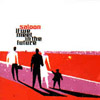 Last year around this time, I reviewed Saloon's debut album, This Is What We Call Progress. In it, I expressed the hope that with time, the Reading, UK quintet would more fully develop and enrich their fledgling sound. If We Meet In the Future, their new album, unfortunately does not show evidence of the outcome for which I'd hoped. Still taking strong cues from Stereolab and Broadcast, Saloon sadly never seems to quite live up to their full potential. This is not to say that any of their songs are unlistenable, but simply that their humble approach to recording is just *too* humble. If We Meet In the Future has a few lovely tracks: "Que Quieres?" is soothingly melancholic and "Dreams Mean Nothing" features a hypnotic film-noir croon. The originality of these two tracks stand in marked contrast to more meandering, uninteresting songs like "Absence" and "The Good Life." Lead singer Amanda Gomez' voice is sweet and easy on the ears, but often lacks backbone. That said, and despite my complaints with this album, I still feel that Saloon has the talent to come into their own and mature into something more substantial, but the question remains whether or not they can actually pull it off. - Jessica Tibbits
Last year around this time, I reviewed Saloon's debut album, This Is What We Call Progress. In it, I expressed the hope that with time, the Reading, UK quintet would more fully develop and enrich their fledgling sound. If We Meet In the Future, their new album, unfortunately does not show evidence of the outcome for which I'd hoped. Still taking strong cues from Stereolab and Broadcast, Saloon sadly never seems to quite live up to their full potential. This is not to say that any of their songs are unlistenable, but simply that their humble approach to recording is just *too* humble. If We Meet In the Future has a few lovely tracks: "Que Quieres?" is soothingly melancholic and "Dreams Mean Nothing" features a hypnotic film-noir croon. The originality of these two tracks stand in marked contrast to more meandering, uninteresting songs like "Absence" and "The Good Life." Lead singer Amanda Gomez' voice is sweet and easy on the ears, but often lacks backbone. That said, and despite my complaints with this album, I still feel that Saloon has the talent to come into their own and mature into something more substantial, but the question remains whether or not they can actually pull it off. - Jessica Tibbits
samples:
Mapstation feat. Ras Donovan, "Version Train"
Staubgold
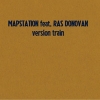 Stefan Schneider's latest release as Mapstation features reworkings and versions of tracks from his full-length, as well as some new tracks. The focus is on Schneider's work with reggae singer Ras Donovan on "Gravity" and "Wake Up," which appeared on A Way to Find the Day and gets two versions here. While the pairing is an interesting one that is sure to spark more interest and conversation, it is still an awkward one as this release shows. The two men have certainly grown more comfortable working together, and their music is full of melody with a lazy shifting style. Relaxation is a given, with a gentle bounce and sway that begs the body to rise and fall with the proceedings. Unfortunately, the collaboration still doesn't connect fully, with Schneider's music providing a backdrop that is often, though not always, jarred by the voice and inflections of Donovan. "Gravity" is full of lyrics of polarity, opposites, and the expected call-outs of reggae and dub, but Donovan's staccato is still too harsh for its surroundings. "Wake Up" gets reinterpreted with Scallo, a DJ-vocalist with ties to Donovan, but Scallo's jarring delivery creates cracks in an otherwise smooth exterior. "Wake Up version," in fact, is a revelation just because it features no vocals, and the true essence of the track is allowed to be on display. Not to be too cutting, though, on "Be True" the pair get it just right: Donovan wails and professes, with as little rapping or chatting as possible. Suddenly a transformation occurs, and even though the lyrics are a bit simplistic, juvenile, even, the rhythm and vocals are sexy enough to make you lose control, and forget whatever you were just thinking about. Schneider's other work, including Radian's Martin Brandlmayr this time, is as concise and yet full of life as always, particularly "Effects of My Haste." For once, I felt the true meaning of the Donovan connection, though, and based on the promise of "Be True," there's greatness on the horizon from these two. - Rob Devlin
Stefan Schneider's latest release as Mapstation features reworkings and versions of tracks from his full-length, as well as some new tracks. The focus is on Schneider's work with reggae singer Ras Donovan on "Gravity" and "Wake Up," which appeared on A Way to Find the Day and gets two versions here. While the pairing is an interesting one that is sure to spark more interest and conversation, it is still an awkward one as this release shows. The two men have certainly grown more comfortable working together, and their music is full of melody with a lazy shifting style. Relaxation is a given, with a gentle bounce and sway that begs the body to rise and fall with the proceedings. Unfortunately, the collaboration still doesn't connect fully, with Schneider's music providing a backdrop that is often, though not always, jarred by the voice and inflections of Donovan. "Gravity" is full of lyrics of polarity, opposites, and the expected call-outs of reggae and dub, but Donovan's staccato is still too harsh for its surroundings. "Wake Up" gets reinterpreted with Scallo, a DJ-vocalist with ties to Donovan, but Scallo's jarring delivery creates cracks in an otherwise smooth exterior. "Wake Up version," in fact, is a revelation just because it features no vocals, and the true essence of the track is allowed to be on display. Not to be too cutting, though, on "Be True" the pair get it just right: Donovan wails and professes, with as little rapping or chatting as possible. Suddenly a transformation occurs, and even though the lyrics are a bit simplistic, juvenile, even, the rhythm and vocals are sexy enough to make you lose control, and forget whatever you were just thinking about. Schneider's other work, including Radian's Martin Brandlmayr this time, is as concise and yet full of life as always, particularly "Effects of My Haste." For once, I felt the true meaning of the Donovan connection, though, and based on the promise of "Be True," there's greatness on the horizon from these two. - Rob Devlin
samples:
Dub Syndicate, "Murder Tone"
On-U Sound
 There's a chilled-out and generally cool feeling to every song on this disc. Every song is a pure, vibrating, and relaxing mix of dub beats and hyponotic melodies culled from a myriad of cultural influences. Adrian Sherwood blends everything together with elegant production techniques; consuming bass melodies and driving rhythms ride into and run with floating guitar melodies, blaring saxophones, and dabs of sitar and tablas. The album kicks off with a killer mix of Prince Far I's "African Landing" and never comes down from that point: it's a swirling mesh of heavy bass, uplifting guitars, and a plethora of studio tricks. Sherwood has a knack for making the smallest adjustments to certain sounds so that, despite their sometimes repetitive nature, they sound fresh throughout. "Let the Spirit Rise" makes excellent use of this technique. A rabid and hyper bass melody parades throughout the entire song while James Bond-esque strings and smoothness wonder about over the top. Multiple times throughout the song Sherwood swtiches up the color of that melody and pans it all over the stereo spectrum keeping the same tune moving throughout the whole song in various forms. There's a special sort of attitude suffused throughout every song. My shoulders always loose their tension, my head always starts nodding, and my breathing always slows and deepens when listening. I'm not sure how, but Dub Syndicate manages to keep every song laid back while still applying gracious amounts of funk and groove. - Lucas Schleicher
There's a chilled-out and generally cool feeling to every song on this disc. Every song is a pure, vibrating, and relaxing mix of dub beats and hyponotic melodies culled from a myriad of cultural influences. Adrian Sherwood blends everything together with elegant production techniques; consuming bass melodies and driving rhythms ride into and run with floating guitar melodies, blaring saxophones, and dabs of sitar and tablas. The album kicks off with a killer mix of Prince Far I's "African Landing" and never comes down from that point: it's a swirling mesh of heavy bass, uplifting guitars, and a plethora of studio tricks. Sherwood has a knack for making the smallest adjustments to certain sounds so that, despite their sometimes repetitive nature, they sound fresh throughout. "Let the Spirit Rise" makes excellent use of this technique. A rabid and hyper bass melody parades throughout the entire song while James Bond-esque strings and smoothness wonder about over the top. Multiple times throughout the song Sherwood swtiches up the color of that melody and pans it all over the stereo spectrum keeping the same tune moving throughout the whole song in various forms. There's a special sort of attitude suffused throughout every song. My shoulders always loose their tension, my head always starts nodding, and my breathing always slows and deepens when listening. I'm not sure how, but Dub Syndicate manages to keep every song laid back while still applying gracious amounts of funk and groove. - Lucas Schleicher
samples:
Antipop Consortium, "Antipop Consortium vs. Matthew Shipp"
Thirsty Ear
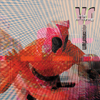 Collaboration between jazz and hip-hop seems very natural, and one would expect the meeting of these two creative, improvisational, dynamic styles would result in a compelling piece of music. Still, the individual components of such a meeting would have to be up to the task, and on this release one side is, and the other is clearly not. Things start out well enough with "Places I've Never Been." Shipp takes advantage of the piano's percussive side and pounds out chord beats that bounce and put the programmed beats that lay over them to shame. Synth and bass sidle alongside Shipp for texture, but his piano is the centerpiece, and the synthesis of these elements amps up expectations for what is to follow. Unfortunately, the very next track lets all the air out of the tires. "Staph" is where Antipop comes in, and after a tuneful intro by Shipp's band, Antipop's Beans and Priest follow along like an anchor. Their flow, if you can call it that, is akin to the clipped, speedy delivery of an auctioneer and seems to move along the tune as if they recorded it irrespective of the beats programmed. Their verses sit awkwardly in open spaces in the middle of the body of the jazz tune, which eventually fades out unceremoniously. "I think there'd be some very angry listeners," recites Antipop on "Short Horn," "if there wasn't vocals over this." Much of the lyrics on this track are about how what we are listening to is "powerful music," however I can't help but feel that Antipop's lethargic, mediocre presence is robbing Shipp, Parker, Brown, Jamal, and Carter of their strength. The music that comprises "Short Horn" would have been excellent on it's own, and in the hands of a more capable and competent rapper, quite possibly amazing. "A Knot In Your Bop" marks a strange misstep for both sides of this project, however. Shipp and his band trot out a rather bland version of Miles Davis' "All Blues," letting Antipop program tinny beats and talk all over it. It's a strange blip, bringing out a very recognizable tune (and not acknowledging it in any way) and mostly results in confusion and annoyance. "SVP" is equally perplexing, a simple instrumental that repeats a short series of notes accented with the occasional click or blip beat. It never goes anywhere. Only "Monstro City" makes any kind of positive impression, with Antipop doing a (intentional this time) spoken word over a dark, noir bass heavy piece. They finally allow themselves to take a breath between their words, utilizing pauses and silence to create tension and paint a vivid picture of a couple parting. There is no conflict or story, just the image of them walking from one another and the feelings that evokes. It marks a distinct and welcome change from much of their other output. The album closes with "Free Hop," and finally allows Shipp and co. to cut loose. They absolutely tear through the piece, notes fall like anvils, each one crashing amidst a rain of others. It is a true show of force that flaunts the brilliance of these musicians. While this final track is invigorating, it's also disappointing in that this level of musicianship and energy could not be captured throughout the rest of the disc. Antipop Consortium vs. Matthew Shipp is well-intentioned, occasionally interesting, though ultimately frustrating. - Michael Patrick Brady
Collaboration between jazz and hip-hop seems very natural, and one would expect the meeting of these two creative, improvisational, dynamic styles would result in a compelling piece of music. Still, the individual components of such a meeting would have to be up to the task, and on this release one side is, and the other is clearly not. Things start out well enough with "Places I've Never Been." Shipp takes advantage of the piano's percussive side and pounds out chord beats that bounce and put the programmed beats that lay over them to shame. Synth and bass sidle alongside Shipp for texture, but his piano is the centerpiece, and the synthesis of these elements amps up expectations for what is to follow. Unfortunately, the very next track lets all the air out of the tires. "Staph" is where Antipop comes in, and after a tuneful intro by Shipp's band, Antipop's Beans and Priest follow along like an anchor. Their flow, if you can call it that, is akin to the clipped, speedy delivery of an auctioneer and seems to move along the tune as if they recorded it irrespective of the beats programmed. Their verses sit awkwardly in open spaces in the middle of the body of the jazz tune, which eventually fades out unceremoniously. "I think there'd be some very angry listeners," recites Antipop on "Short Horn," "if there wasn't vocals over this." Much of the lyrics on this track are about how what we are listening to is "powerful music," however I can't help but feel that Antipop's lethargic, mediocre presence is robbing Shipp, Parker, Brown, Jamal, and Carter of their strength. The music that comprises "Short Horn" would have been excellent on it's own, and in the hands of a more capable and competent rapper, quite possibly amazing. "A Knot In Your Bop" marks a strange misstep for both sides of this project, however. Shipp and his band trot out a rather bland version of Miles Davis' "All Blues," letting Antipop program tinny beats and talk all over it. It's a strange blip, bringing out a very recognizable tune (and not acknowledging it in any way) and mostly results in confusion and annoyance. "SVP" is equally perplexing, a simple instrumental that repeats a short series of notes accented with the occasional click or blip beat. It never goes anywhere. Only "Monstro City" makes any kind of positive impression, with Antipop doing a (intentional this time) spoken word over a dark, noir bass heavy piece. They finally allow themselves to take a breath between their words, utilizing pauses and silence to create tension and paint a vivid picture of a couple parting. There is no conflict or story, just the image of them walking from one another and the feelings that evokes. It marks a distinct and welcome change from much of their other output. The album closes with "Free Hop," and finally allows Shipp and co. to cut loose. They absolutely tear through the piece, notes fall like anvils, each one crashing amidst a rain of others. It is a true show of force that flaunts the brilliance of these musicians. While this final track is invigorating, it's also disappointing in that this level of musicianship and energy could not be captured throughout the rest of the disc. Antipop Consortium vs. Matthew Shipp is well-intentioned, occasionally interesting, though ultimately frustrating. - Michael Patrick Brady
samples:
Jonathan Coleclough, "Casino"
Idea
 The casino reveals itself to be a source of much more than free buffets and cheap thrills on this unprocessed field recording that combines Vegas with Antiguan tree frogs, but the uncompromisingly raw format and lack of manipulation hold back my interest. Coleclough's recordings have consistently amazed me with their exquisite processing and arrangement of sonic minutiae, drawing out the tonalities of metal, acoustic instruments, and nature sounds into epic, drone-based pieces. But that discography makes this record's simplicity even more disappointing. Though it's well arranged—for a straight field recording—I can't help but imagine what this could've been with a little work. Coleclough has generally succeeded in exploiting the similarities and differences of natural and artificial sounds, and that is the highlight of this recording. The first side of the LP, or ten minutes of the accompanying CD which extends and gradually mixes the two sides, is the pinnacle of casino gaudiness, with tinny slot machine jingles, ringing coins, and distant country music riffs. The slots grow grating before long, but luckily Coleclough knows when to move on. The recording improves from there, especially on the CD version, as the music gently transitions into the second part's ocean waves and frogs, whose chirping bears subtle similarities to the previous digital cacophony. The frog sounds are nothing special and don't exhibit much development. It's evidence that, given enough patience, listening closely to almost anything will reveal detail previously overlooked. So while I like this record, it's not something I'll listen to very often, and the sparse, soothing sounds of ocean waves at the conclusion remind me of some bad "relaxation" tape. Casino is rather collector-oriented, released on a massive piece of vinyl in an edition of 400. I'd definitely advise anyone interested in doing some serious listening to check out Coleclough, but start with one of his composed works, such as the excellent, and readily available, Period. - Steve Smith
The casino reveals itself to be a source of much more than free buffets and cheap thrills on this unprocessed field recording that combines Vegas with Antiguan tree frogs, but the uncompromisingly raw format and lack of manipulation hold back my interest. Coleclough's recordings have consistently amazed me with their exquisite processing and arrangement of sonic minutiae, drawing out the tonalities of metal, acoustic instruments, and nature sounds into epic, drone-based pieces. But that discography makes this record's simplicity even more disappointing. Though it's well arranged—for a straight field recording—I can't help but imagine what this could've been with a little work. Coleclough has generally succeeded in exploiting the similarities and differences of natural and artificial sounds, and that is the highlight of this recording. The first side of the LP, or ten minutes of the accompanying CD which extends and gradually mixes the two sides, is the pinnacle of casino gaudiness, with tinny slot machine jingles, ringing coins, and distant country music riffs. The slots grow grating before long, but luckily Coleclough knows when to move on. The recording improves from there, especially on the CD version, as the music gently transitions into the second part's ocean waves and frogs, whose chirping bears subtle similarities to the previous digital cacophony. The frog sounds are nothing special and don't exhibit much development. It's evidence that, given enough patience, listening closely to almost anything will reveal detail previously overlooked. So while I like this record, it's not something I'll listen to very often, and the sparse, soothing sounds of ocean waves at the conclusion remind me of some bad "relaxation" tape. Casino is rather collector-oriented, released on a massive piece of vinyl in an edition of 400. I'd definitely advise anyone interested in doing some serious listening to check out Coleclough, but start with one of his composed works, such as the excellent, and readily available, Period. - Steve Smith
samples:
We know that our music picks may be somewhat challenging to find, which is why we have a community section which can be used to obtain nearly everything available on this site. |